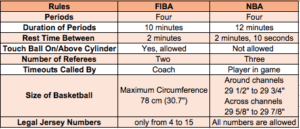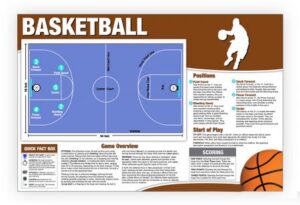Basic Basketball Rules What Coaches Need to Know
Some Basic Basketball rules are not overly complicated, although if you’ve ever picked up the FIBA rulebook, or any rulebook from one of the major governing bodies, you might very well think otherwise. At first blush, there seem to be a lot of rules to know.
In reality; these rulebooks can be simplified and broken down into three basic types of rules.
Sure, every governing body will have its specific regulations concerning how things are done, and you should be somewhat familiar with the more important ones. However, the basic rules, whether you are looking at rules from the NBA, the NCAA, or high school basketball rules, will be more or less the same.
There are three very broad categories of basketball rules that every player and coach should understand if they want to play or coach basketball and do well.
Realize the league you play in is likely to have its specific version of these rules, but if you compare basketball rulebooks for one league to another, you will find several areas where basketball’s basic rules are pretty much the same.
Three Main Categories of Basketball Rules To Know
We can break down the various basic rules of the game into three major categories:
- Basketball Rules Concerning Game Time – in other words, when is the ball in play, and when is it not? How long is the basketball game, What starts the clock, and what stops it?
- Basketball Rules Concerning Violations – what moves can your players do with the ball, and what moves aren’t legal? i.e., what will your players do with the ball that will cause your team to lose possession of it?
- Basketball Rules Concerning Fouls – what type of contact between offensive and defensive players is allowed, and how much of it is not allowed?
A general explanation of the rules of basketball will be all you need under most circumstances. Knowing this will get you through the majority of your coaching career, especially true if you coach youth basketball.
Basic Basketball Rules Is That All?
The only time when you would need to understand the rules in more specific terms than the basic rules above would likely be at game time. As mentioned already, every league will have its own set of specific rules, some more detailed and complex than others. Choose the set of rules that applies to your situation.
The high school basketball rules followed by most schools in the US are from the National Federation of State High School Associations (NFHS). You can’t download a free copy of the high school basketball rules like you can from the pros and college leagues, but the NFHS publishes rule books and guides, and a couple are carried by Amazon:
If it’s the pros you’re interested in, take a look at the NBA rules or the WNBA rules, or if you are interested in international rules, you can check out FIBA rules.
There are also college rules ( NCAA ) you should review if you coach at that level or are a die-hard fan.
In general, understanding basketball’s basic rules is important for every coach and player, but I wouldn’t go so far as to say that every coach needs to be able to recite verbatim every single rule in the rulebook for their league.
The specific rules are important at game time – always have a copy of the official rules on the scorer’s table for reference if a debate ensues – but most of our coaching career takes place during team practices. So for most of our coaching careers, I would suggest a general knowledge of the rules will suffice.

